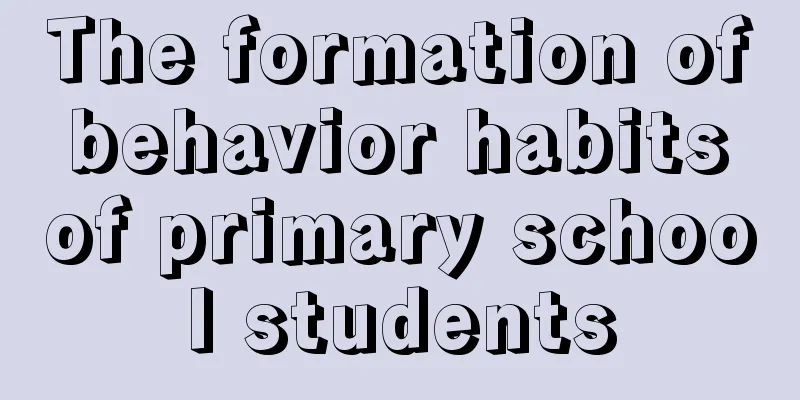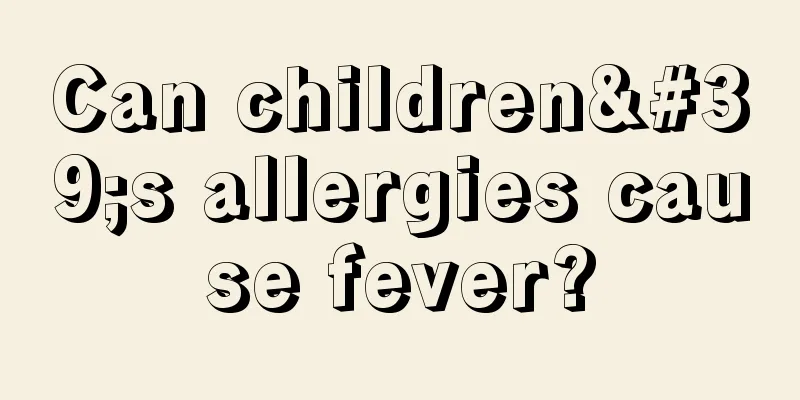The formation of behavior habits of primary school students

|
When children are young, they are definitely ignorant. Their behavioral habits need to be regulated and they should gradually develop good behavioral habits. Children of different ages have different behavioral habits. We must start to educate children from elementary school, regulate their daily behavior, and let them grow up healthily. So, what are the behavioral habits of primary school students? Let’s take a closer look at it below.
(1) Be polite and greet teachers and guests proactively when you see them. (2) Consciously use polite expressions such as “please”, “hello”, “thank you”, “sorry”, and “goodbye”. (3) When accepting help from others, thank them with a smile. (4) Do not fight, swear, or make noise in public places. (5) Do not give classmates nicknames or discriminate against classmates with physical disabilities. When a classmate answers a question incorrectly, do not make a fuss or laugh at him. 2. The habit of honesty and trustworthiness (1) Be honest and trustworthy. Do what you say you will do. (2) If what you promised is indeed difficult to accomplish, you should explain the reason to the other party and apologize to them sincerely. (3) If you borrow something from someone, you must return it on time and keep your word.
(1) Listen patiently to others and do not interrupt them casually. (2) Listen carefully to what the other person is saying and don’t think about your own things while listening. (3) When you hear criticism from others, don’t get excited. Just listen to what they say calmly. (4) Do not disturb others’ study, rest, work or life. If you disturb others, you should apologize promptly. (5) Do not touch other people’s things without permission. 4. The habit of being punctual and cherishing time (1) Go to bed on time at night and get up on time in the morning. (2) Go home on time after school and do not hang around on the streets. (3) After returning home, immediately complete the homework assigned by the teacher and finish today’s work today. (4) Do things in a planned way, do not be blind or procrastinate. 5. Develop a habit of gratitude (1) Understand the hardships of parents and elders, respect parents, and take the initiative to wash their feet, massage their backs, and pick up food for them. (2) Take the initiative to do some housework for your parents within your ability. (3) Respect the work of sanitation workers and traffic police.
(1) Take good care of your school supplies. Do not scribble on your textbooks or tear up your homework books. (2) Do not ask parents for money casually, and do not spend money on snacks, toys, etc. (3) Cherish food, do not be picky about food, and do not waste food. (4) Save electricity and water, turn off lights when leaving the house, and close faucets after use. (5) Take good care of your own, other people’s and collective property. Open and close doors and windows gently and handle items with care. Do not write, draw or stick anything on the table or stool. 7. The habit of observing order (1) When going up and down stairs, walk slowly and quietly, and keep to the right side. (2) Obey traffic rules, stop at red lights and go at green lights, do not cross the road randomly, and do not chase, run, or play on the road. (3) Queue up consciously when shopping or boarding a bus. Observe discipline in public and don't make loud noises. (4) Take good care of the flowers, plants, trees and public facilities in schools and parks. Do not trample on green areas, break branches or scribble on them. |
<<: How to reduce swelling after falling on the head
>>: Cultivation of children's behavioral habits
Recommend
What to eat when children have anorexia
Life is gradually improving, and the quality of l...
What should I do if my child can’t hold his urine?
Normally, many children have varying degrees of d...
What causes arrhythmia in children?
Some parents may encounter the phenomenon of chil...
Will babies be zinc deficient?
We often find that babies have poor appetite, sle...
How much clothes should children wear in winter
The phrase we hear most often in life is that the...
What is the standard height and weight for a 21-month-old baby?
From the birth of their children, parents have be...
Can children take melatonin?
I believe that people who are not familiar with m...
What's wrong with the red spots on the corners of my baby's mouth?
A baby's health is often very fragile due to ...
Complications that babies born one month prematurely are prone to
Some families do not take the baby too seriously ...
What to do if the baby's temperature is low after the fever subsides
Children have relatively weak constitutions. Due ...
What should I do if my baby has bronchitis and fever?
The baby is still young and is often attacked by ...
What should children eat to increase height and supplement calcium?
The main component of bones is calcium, so if you...
What to do if the umbilical cord of a newborn is infected
We all know that taking care of a newborn is a pa...
What should I do if my child has a cold, fever and runny nose?
In people's daily lives, diseases are caused ...
What to do if baby has eczema and dry skin
We all know that the baby's skin is very deli...









